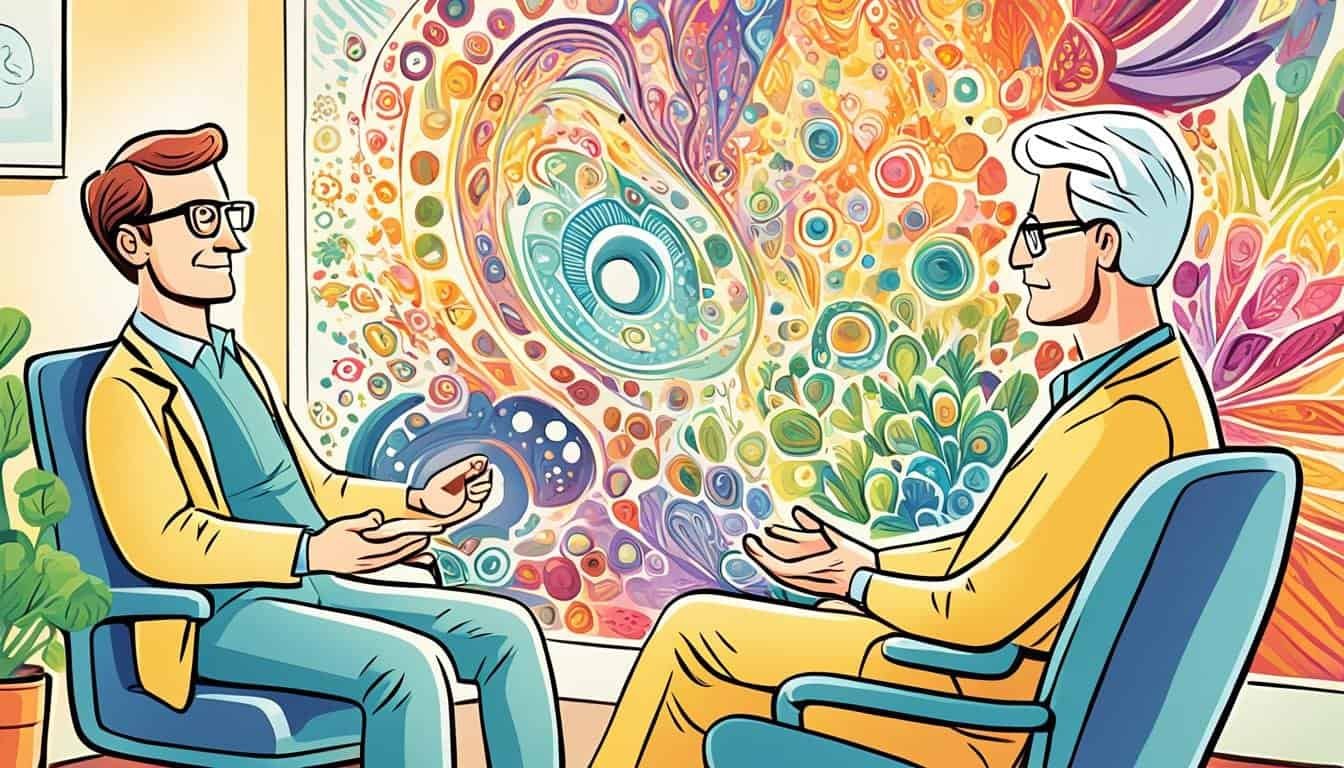Exploring Psychedelics in Therapy Benefits
“The greatest glory in living lies not in never falling, but in rising every time we fall.” – Nelson Mandela
Psychedelics have gained significant attention in recent years as a potential breakthrough in therapy. Studies and research have shown that therapeutic psychedelics, such as psilocybin and MDMA, hold immense promise in transforming mental health treatment and offering new possibilities for those struggling with various mental disorders.
This article explores the rising interest in psychedelic therapy, the benefits it offers, current research and studies in the field, potential applications, emerging trends, responsible use and regulation, and the future of this unique treatment approach. We will also delve into the importance of education and awareness in this rapidly evolving field.
Key Takeaways:
- Psychedelics in therapy have the potential to revolutionize mental health treatment.
- Research shows that therapeutic psychedelics can alleviate symptoms of various mental disorders.
- Psychedelic therapy promotes transformative healing through shifts in perception and consciousness.
- Responsible use and regulation are essential to ensure the safety and effectiveness of psychedelic therapy.
- Educating healthcare professionals and the general public about psychedelic therapy is crucial for its future integration into mainstream mental healthcare.
The Rising Interest in Psychedelic Therapy
In recent years, a growing interest in the use of psychedelics in therapy has emerged, driven by the promising results of studies highlighting their potential for transformative healing in mental health treatment. Psychedelic therapy, also known as psychedelic-assisted therapy, involves the use of substances such as psilocybin and MDMA, combined with therapeutic support, to facilitate emotional breakthroughs and personal growth.
The recognition and acceptance of psychedelic therapy are increasing within the medical and mental health communities as researchers and practitioners continue to explore its potential benefits. This innovative approach demonstrates the power of combining psychedelic substances with therapy to address mental health conditions in a unique and profound way.
An Evolving Field
Psychedelic therapy is an evolving field that challenges traditional approaches to mental health treatment. It opens up new possibilities for individuals seeking alternative options for their well-being. As research progresses, the potential for psychedelic therapy to revolutionize mental healthcare becomes increasingly evident.
The integration of psychedelics into therapy allows individuals to tap into untapped emotions and experiences, leading to deep personal insights and lasting transformations.
Promising Results and Renewed Hope
Research on psychedelic therapy has shown promising results in the treatment of various mental health conditions, including depression, anxiety disorders, and PTSD. These substances offer new avenues for individuals who have not found relief through conventional treatments, providing renewed hope for their well-being.
The therapeutic effects of psychedelics extend beyond symptom reduction; they offer the potential for profound self-discovery, enhanced emotional processing, and improved interpersonal relationships. By altering neural pathways and promoting neuroplasticity, these substances facilitate transformative healing at a cognitive and emotional level.
| Benefits of Psychedelic Therapy | Potential Applications |
|---|---|
| Reduces symptoms of depression, anxiety, and PTSD | Depression |
| Facilitates emotional breakthroughs | Anxiety disorders |
| Enhances emotional processing and self-discovery | PTSD |
| Improves interpersonal relationships | Other mental health conditions |
| Facilitates personal growth and transformative healing | Addiction |
These promising outcomes have sparked a surge of interest and investment in psychedelic therapy, with researchers and practitioners striving to uncover the full potential of these substances.
The rising interest in psychedelic therapy signifies a paradigm shift in mental healthcare. As stigma surrounding psychedelics diminishes, more people are exploring these transformative therapeutic approaches. With ongoing research, improved regulations, and increased awareness, psychedelic therapy has the potential to revolutionize mental health treatment and provide a new frontier of healing.
The Benefits of Psychedelic Therapy
Psychedelic therapy offers a range of potential benefits for mental health treatment. Research has shown that these substances can help individuals experience a profound shift in their perception and consciousness, leading to transformative healing.
Psychedelics have been found to be effective in reducing symptoms of depression, anxiety, and PTSD, as well as promoting personal growth and self-discovery. They can also enhance emotional processing, increase empathy, and improve interpersonal relationships.
The therapeutic effects of psychedelics are believed to be due to their ability to alter neural pathways and promote neuroplasticity in the brain, allowing for new perspectives and insights.
“Psychedelic therapy has the potential to unleash the inner healing capacity within individuals, allowing them to explore deep-rooted emotions and experiences that may have been previously inaccessible. It provides a unique opportunity for individuals to work through unresolved trauma and gain a renewed sense of self-awareness and clarity.”
Dr. Amanda Thompson, Psychedelic Therapist
A growing body of research supports the use of psychedelics in therapy, highlighting their potential as a complementary approach to traditional mental health treatments. The transformative nature of psychedelic therapy makes it a promising avenue for individuals seeking alternative healing methods.
Benefits of Psychedelic Therapy:
- Reduces symptoms of depression, anxiety, and PTSD
- Promotes personal growth and self-discovery
- Enhances emotional processing
- Increases empathy
- Improves interpersonal relationships
The profound shifts in perception and consciousness experienced during psychedelic therapy can open doors to profound healing and self-exploration. These benefits make psychedelic therapy an exciting and promising field of research and practice, offering new possibilities for transformation and well-being.
| Study | Condition | Findings |
|---|---|---|
| Carhart-Harris et al. (2016) | Treatment-resistant depression | Significant reduction in depressive symptoms |
| Mithoefer et al. (2010) | Post-traumatic stress disorder (PTSD) | Decrease in PTSD symptoms and improvement in quality of life |
| Griffiths et al. (2016) | Anxiety and existential distress in cancer patients | Reduced anxiety and improved quality of life |
Current Research and Studies on Psychedelic Therapy
As interest in psychedelic therapy continues to grow, scientists and researchers are conducting extensive research and studies to explore its potential benefits. Clinical trials are being conducted to examine the safety and efficacy of psychedelic substances for various mental health conditions, such as depression, anxiety, and PTSD.
These studies aim to understand the mechanisms of action of psychedelics, determine optimal dosing protocols, and evaluate the long-term effects of psychedelic therapy. Research is also focusing on integrating psychedelic experiences into therapeutic settings and developing guidelines for responsible use.
“The findings from these research efforts have shown promising results, opening up new possibilities for the use of psychedelics in therapy.”
Scientists are investigating the ways in which psychedelic substances can facilitate transformative healing and promote neuroplasticity. The effects of psychedelics on neural pathways and cognitive processes are being studied, with the goal of gaining a deeper understanding of their therapeutic potential.
Furthermore, research is exploring the integration of psychedelic therapy with traditional therapeutic modalities, such as talk therapy and cognitive-behavioral techniques. This interdisciplinary approach aims to enhance the effectiveness of treatment and provide individuals with a comprehensive and holistic healing experience.
While the field of psychedelic therapy is still relatively new, the current research and studies are paving the way for further exploration and advancement. The promising results obtained so far provide a solid foundation for continued investigation into the benefits of psychedelic therapy.
The Potential Applications of Psychedelic Therapy
Psychedelic therapy has the potential to be used for a wide range of mental health conditions. Current research is exploring the use of psychedelics in the treatment of depression, anxiety disorders, PTSD, addiction, and end-of-life distress. The therapeutic effects of these substances can provide individuals with new insights, expand their perspectives, and help them process unresolved trauma. Psychedelic therapy offers a unique approach to mental health treatment by addressing the underlying causes of the symptoms rather than just managing them. The potential applications of psychedelic therapy are still being explored, and ongoing research will provide more insights into its effectiveness and safety.
As more studies are conducted and evidence is gathered, the potential applications of psychedelic therapy continue to expand. The use of psychedelics in mental health treatment has shown promising results, suggesting that these substances could be integrated into mainstream therapeutic practices. The following table highlights some of the potential applications of psychedelic therapy:
| Mental Health Condition | Potential Benefits |
|---|---|
| Depression | – Reduced symptoms – Enhanced mood and emotional well-being – Increased self-awareness and insight |
| Anxiety Disorders | – Decreased anxiety levels – Improved coping mechanisms – Expanded perspective on fears and triggers |
| PTSD | – Alleviated trauma symptoms – Enhanced processing and integration of traumatic experiences – Reduction in hypervigilance and flashbacks |
| Addiction | – Increased motivation for recovery – Access to subconscious patterns and root causes – Support in breaking addictive patterns |
| End-of-Life Distress | – Lessened fear and anxiety surrounding death – Enhanced acceptance and peace – Spiritual and existential insights |
While the potential benefits of psychedelic therapy are promising, it’s important to note that further research is needed to fully understand the effectiveness and safety of these treatments. Ongoing studies will help refine the protocols and guidelines for the use of psychedelics in therapy, ensuring optimal outcomes for individuals seeking this alternative approach.
In the next section, we will explore emerging trends in psychedelic therapy and how they are shaping the future of mental healthcare.
Emerging Trends in Psychedelic Therapy
Psychedelic therapy is an emerging field that is gaining widespread attention and recognition. As research and studies on psychedelics continue to expand, several exciting trends are shaping the future of psychedelic therapy.
One significant trend is the development of standardized protocols for psychedelic therapy. These protocols outline the best practices for administering psychedelic-assisted therapy, ensuring a safe and effective treatment experience. Standardization enhances the consistency and reliability of psychedelic therapy, allowing for better comparisons across studies and promoting the broader integration of this therapeutic approach into mainstream mental healthcare.
The integration of psychedelic experiences into mainstream mental healthcare is another important trend. More therapists and healthcare professionals are recognizing the potential of psychedelic therapy as a valuable addition to existing treatment modalities. By combining psychedelic substances with evidence-based therapy techniques, practitioners can maximize the therapeutic benefits and help individuals achieve transformative healing and personal growth.
Exploring new psychedelic substances and combinations is also a fascinating trend in the field. Researchers are investigating the therapeutic potential of various psychedelics beyond psilocybin and MDMA, examining substances like LSD, DMT, and ibogaine. Additionally, studies are exploring the effectiveness of combining different psychedelics or combining them with other therapies to enhance treatment outcomes. These explorations open up new possibilities and expand the toolkit for psychedelic-assisted therapy.
Furthermore, the growing interest in psychedelic therapy has led to increased funding for research and the establishment of dedicated centers and institutions focused on studying the therapeutic potential of psychedelics. This support provides resources and infrastructure for conducting rigorous research, advancing the understanding of psychedelic therapy, and training the next generation of healthcare professionals in this field.
In summary, the emerging trends in psychedelic therapy reflect a growing recognition of the field’s potential and a commitment to its advancement. The development of standardized protocols, the integration of psychedelic experiences into mainstream mental healthcare, the exploration of new substances and combinations, and the increased funding and support all contribute to the evolution and acceptance of psychedelic therapy as a valuable approach to healing and mental wellness.
The Importance of Responsible Use and Regulation
While the potential benefits of psychedelic therapy are promising, it is essential to emphasize responsible use and regulation. Psychedelic substances should only be used under the guidance of trained professionals in a controlled therapeutic setting. The importance of ensuring the safety and wellbeing of individuals undergoing psychedelic therapy cannot be overstated. Proper screening, preparation, and integration support are crucial elements of the therapeutic process. Additionally, regulatory frameworks need to be in place to ensure that psychedelic therapy is conducted ethically and within legal boundaries.
Responsible use is paramount in psychedelic-assisted therapy to minimize potential risks and maximize therapeutic outcomes. Trained professionals play a vital role in guiding individuals through the psychedelic experience, providing a safe and supportive environment. They offer structure, helping individuals navigate the depths of their psyche, while mitigating any potential challenging experiences.
Preparation is another important aspect of responsible psychedelic therapy. It involves thorough screening to assess an individual’s suitability for the treatment and to identify any potential contraindications or risks. Additionally, preparation sessions educate and inform individuals about the psychedelic experience, managing expectations, and outlining the therapeutic process.
Integration support is crucial post-session, as individuals make sense of their psychedelic experience and integrate the insights gained into their daily lives. This support can take various forms, such as individual and group therapy sessions, mindfulness practices, and creative expression. Integration helps individuals process and integrate the newfound insights, leading to lasting positive changes.
Psychedelic therapy has immense potential, but it must be approached responsibly and with proper regulation. Legal frameworks are necessary to ensure that psychedelic therapy is conducted ethically, protecting individuals seeking treatment and the integrity of the practice itself.
The regulation of psychedelic therapy involves establishing guidelines and standards for practitioners, as well as monitoring and evaluating the therapeutic process. This ensures that therapists adhere to professional codes of conduct, follow evidence-based practices, and prioritize the safety and wellbeing of their clients.
With responsible use and regulation, psychedelic therapy can continue to evolve as a legitimate and effective treatment option. It has the potential to revolutionize mental health treatment and provide new avenues for healing and personal growth.
The Future of Psychedelic Therapy
The potential for psychedelic therapy to revolutionize mental health treatment is bright. Ongoing research and clinical trials are expanding our understanding of these substances and their therapeutic applications. As more evidence emerges, psychedelic therapy is likely to become increasingly accepted and integrated into mainstream mental healthcare.
The future of psychedelic therapy holds the promise of transformative healing and improved mental health outcomes for individuals seeking alternative treatment options.
With the development of new treatment protocols, regulations, and guidelines, the safe and effective use of psychedelics in therapy will be enhanced. As researchers continue to explore the benefits and mechanisms of action of these substances, their potential therapeutic applications will expand even further.
The future of psychedelic therapy is rooted in:
- Advancing research and clinical trials
- Integration into mainstream mental healthcare
- Development of new treatment protocols, regulations, and guidelines
- Expanded therapeutic applications
As the field evolves, advancements and collaboration between researchers, healthcare professionals, and regulatory bodies will be paramount. Together, they will contribute to the safe, effective, and responsible implementation of psychedelic therapy.
Example Table: Current Research on Psychedelic Therapy
| Study | Description | Findings |
|---|---|---|
| Johns Hopkins University Study | A randomized controlled trial exploring the use of psilocybin-assisted therapy in individuals with treatment-resistant depression. | Significant reduction in depressive symptoms and increased well-being after treatment. |
| MAPS-sponsored MDMA Study | A Phase 3 clinical trial investigating the use of MDMA-assisted therapy in individuals with post-traumatic stress disorder (PTSD). | Promising results in reducing PTSD symptoms and improving overall quality of life. |
| Imperial College London Study | Exploration of the impact of psilocybin-assisted therapy on patients with major depressive disorder. | Significant reduction in depressive symptoms and increased psychological well-being. |
This table showcases a snapshot of the current research on psychedelic therapy. These studies demonstrate the positive impact of psychedelic-assisted therapy on mental health and highlight the potential for continued advancements in the field.
The image above represents the potential future of psychedelic therapy, focused on transformative healing and improved mental health outcomes.
The Importance of Education and Awareness
Education and awareness play a critical role in the growing field of psychedelic therapy. It is essential to provide accurate and evidence-based information to healthcare professionals, researchers, and the general public. By increasing awareness about the potential benefits and risks of psychedelic therapy, we can foster open and informed discussions and promote responsible use.
One way to enhance education and awareness is through the development of targeted training programs. These programs can ensure that healthcare professionals have the knowledge and skills to provide safe and effective psychedelic-assisted therapy. By equipping professionals with the necessary tools, we can ensure that patients receive the highest level of care and support.
“Education and awareness are crucial aspects of the growing field of psychedelic therapy.”
“Psychedelic therapy has the potential to revolutionize mental health treatment. However, to fully harness its benefits, it is imperative that the public, professionals, and regulators are well-informed about its safe and responsible use. Education and awareness initiatives can pave the way for a future where psychedelic therapy is considered a legitimate and effective treatment option.”
Transparency and collaboration are also vital in advancing psychedelic therapy. By fostering open communication and collaboration among researchers, practitioners, and regulatory bodies, we can collectively work towards establishing guidelines and best practices for the responsible use of psychedelic treatment. This collaborative approach ensures that the field continues to evolve in an ethical and evidence-based manner.
The Role of Research in Advancing Education and Awareness
Ongoing research plays a fundamental role in advancing education and awareness in the field of psychedelic therapy. Studies and clinical trials contribute to the growing body of evidence supporting the use of psychedelics in mental health treatment. The findings from these studies not only inform healthcare professionals and practitioners but also help educate the public on the potential benefits and limitations of psychedelic-assisted therapy.
One example of this is the recent resurgence of interest in psychedelic research therapy. This research aims to explore the therapeutic potential of psychedelics and their integration into mainstream mental healthcare. The results of these studies are highly influential in shaping public perception and policy around psychedelic therapy.
Education and awareness are essential components of the psychedelic therapy movement. By providing accurate information, developsychedelic research therapynment and regulatory bodies can ensure the responsible use of psychedelic treatment, while fostering a better understanding of its potential benefits and impacts.
Conclusion
Psychedelic therapy has the potential to revolutionize mental health treatment. The growing body of research and studies on psychedelics in therapy has shown promising results in addressing various mental health conditions and promoting transformative healing. However, ensuring responsible use, regulation, and education are essential for the safe and effective implementation of psychedelic therapy.
As the field continues to evolve, it is crucial to prioritize rigorous research, ethical practices, and the wellbeing of individuals seeking psychedelic-assisted therapy. Ongoing advancements and collaboration in the field of psychedelic therapy have the potential to reshape the future of mental healthcare.
By harnessing the benefits of psychedelics in therapy and integrating them into mainstream mental healthcare, we can provide individuals with new avenues for healing and personal growth. It is vital to continue supporting research efforts, developing guidelines, and educating healthcare professionals to ensure the responsible and effective use of psychedelics in the therapeutic setting.
With a commitment to evidence-based practices, ethical standards, and the wellbeing of individuals, psychedelic therapy can pave the way for transformative change in mental health treatment, offering hope and healing to those seeking alternative approaches.
FAQ
What is psychedelic therapy?
Psychedelic therapy, also known as psychedelic-assisted therapy, involves the use of substances like psilocybin and MDMA in conjunction with therapeutic support to facilitate emotional breakthroughs and personal growth.
What are the potential benefits of psychedelic therapy?
Psychedelic therapy offers a range of potential benefits, including reducing symptoms of depression, anxiety, and PTSD, promoting personal growth and self-discovery, enhancing emotional processing, increasing empathy, and improving interpersonal relationships.
What is the current research and studies on psychedelic therapy?
Scientists and researchers are conducting clinical trials to explore the safety and efficacy of psychedelics for various mental health conditions. The research aims to understand the mechanisms of action of psychedelic substances, identify optimal dosing protocols, and determine the long-term effects of psychedelic therapy.
What are the potential applications of psychedelic therapy?
Psychedelic therapy is being explored as a treatment for depression, anxiety disorders, PTSD, addiction, and end-of-life distress. It can provide individuals with new insights, expand their perspectives, and help them process unresolved trauma.
What are the emerging trends in psychedelic therapy?
Some emerging trends in psychedelic therapy include the development of standardized protocols, the integration of psychedelic experiences into mainstream mental healthcare, and the exploration of new psychedelic substances and combinations.
How important is responsible use and regulation in psychedelic therapy?
Psychedelic substances should only be used under the guidance of trained professionals in a controlled therapeutic setting. Proper screening, preparation, and integration support are crucial elements of the therapeutic process, and regulatory frameworks need to be in place to ensure ethical and legal boundaries.
What does the future hold for psychedelic therapy?
Ongoing research and clinical trials are expanding our understanding of psychedelic substances and their potential therapeutic applications. As more evidence emerges, psychedelic therapy is likely to become more widely accepted and integrated into mainstream mental healthcare.
How important is education and awareness in the field of psychedelic therapy?
Education and awareness are crucial in promoting responsible use and fostering open discussions about the potential benefits and risks of psychedelic therapy. Healthcare professionals should receive training to provide safe and effective psychedelic-assisted therapy.
What is the potential of psychedelic therapy in mental health treatment?
Psychedelic therapy holds the potential to revolutionize mental health treatment by providing transformative healing and improved outcomes. Rigorous research, ethical practices, and individual wellbeing are key factors in the development of psychedelic therapy as a legitimate and effective treatment option.







